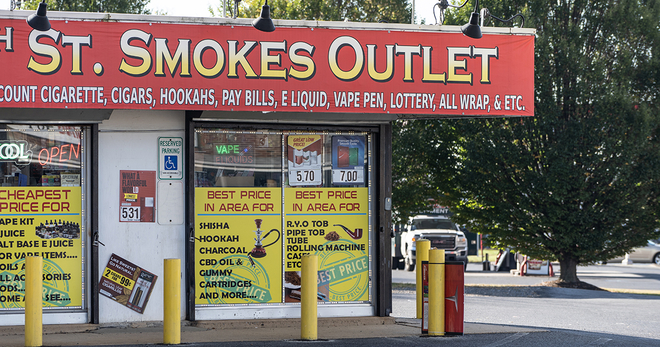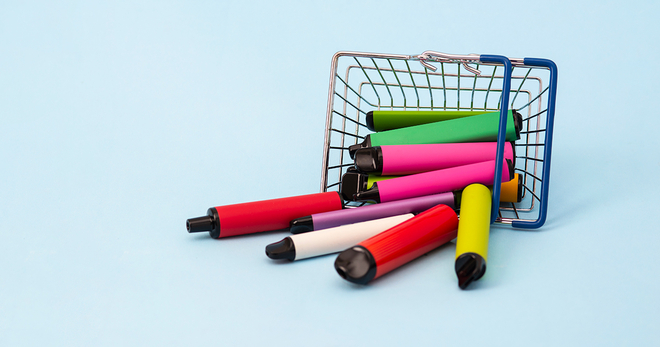How tobacco companies are enlisting music artists like Cardi B to promote tobacco products
DJ suddenly drops a track. With a mic in hand, rapper Roscoe Dash starts to perform as spectators watch, looking intrigued, yet confused. That’s because Dash isn’t on stage in front of a crowd — he’s in a convenience store, among customers and surrounded by ads for cigarillos and little cigars.
Cigar company Swisher Sweets organized the event as part of the Swisher Sweets Artist Project, a marketing campaign that holds music events with emerging artists, including pop-up performances in convenience stores — “Convenience Store Sessions” — and concerts in select cities called “Swisher Sweets Pack Nights.” These events, hosted across the country and set against the backdrop of Swisher Sweets ads, displays and clothes, are examples of how tobacco companies take advantage of loopholes in regulation.
The 1998 Master Settlement Agreement and the 2009 Family Smoking Prevention and Tobacco Control Act prohibited cigarette and smokeless tobacco companies from sponsoring music, sports and other cultural events and creating branded merchandise because of evidence that linked these types of marketing tactics with youth tobacco use. However, other types of tobacco products — including little cigars and cigarillos, e-cigarettes and hookah — are not bound by these restrictions, though the same concerns exist about the connection between these marketing tactics and youth tobacco use.
A Truth Initiative® review of the Swisher Sweets Artist Project, published in Tobacco Control, takes a closer look at how the popular cigar brand sponsors music events to promote its products and reach its target audience.

Attracting a young audience through music
The Swisher Sweets website states that the Artist Project is “an ongoing initiative to provide unique opportunities for artists to create, share and pursue their passion” and allows fans to be “at the forefront of what’s new and emerging in the world of music, arts and entertainment.” The project also makes these cigars appear glamorous and increases exposure to tobacco branding, according to the report.
The Artist Project features two types of events: Swisher Sweet Pack Nights and Convenience Store Sessions. For Swisher Sweet Pack Nights, music artists like Cardi B, Machine Gun Kelly and Travis Porter perform at concerts for “Swisher fans.” Tickets for some pack nights locations included a voucher for packs of certain Swisher Sweets cigars and cigarillos. At other pack night locations, attendees could get special gear and giveaways.
The convenience store sessions take place in retail establishments, which are already heavily filled with point-of-sale tobacco marketing. Research has shown that about one-third of teenage experimentation with smoking can be directly attributed to tobacco marketing in retail environments. Specifically, convenience stores, where 70 percent of youth shop at least once a week, have more tobacco marketing and sell more cigarettes than any other type of retail store.

A research study found that young adults who attend marketing events like these, which encourage consumers to interact with a brand at venues, smoke at higher rates than those who don’t. The pack night performances and convenience store sessions are also recorded and shared on the Swisher Sweets website and YouTube channel.
“This marketing strategy elevates exposure to Swisher Sweets branding from the local retail space to the virtual space for broad exposure to a larger audience,” the article states, adding that the Swisher Sweets website only asks visitors to check a box to verify they are at least 18, and that there is no age verification on the brand’s YouTube channel.
Regulating tobacco marketing
While concerts in convenience stores may sound atypical, tobacco companies have invested in concerts and other music marketing to target young people and African-Americans for decades.
For example, in 2004, tobacco company Brown & Williamson launched the “Kool Mixx” campaign, which included a tour of hip-hop artists, to reach young African-American smokers. Several states successfully sued the company to end the campaign, arguing that it violated the 1998 Master Settlement Agreement, which banned cigarette-branded merchandise and sponsored music events.
In 2007, R.J. Reynolds launched “Farm Free Range Music,” a Camel campaign that associated the brand with indie rock bands. Shortly after an advertisement for the campaign appeared in Rolling Stone, several states sued R.J. Reynolds for violating the MSA because the advertisement used a cartoon and promoted branded merchandise. As a result, R.J. Reynolds canceled the campaign. A 2010 study found that Camel has promoted music tours and events to appeal to trendsetting “hipsters,” an important and influential young adult demographic, since 1995.
Truth Initiative supports the enforcement of current policy, and the extension of restrictions already in place on youth marketing — such as prohibiting sponsorships, restricting branded giveaways and other measures that apply to cigarettes and smokeless tobacco — to additional products, including cigars, hookah and new products like electronic and heat-not-burn cigarettes.
“While currently permissible for cigars, many of these promotional efforts using music sponsorship would be in violation of the Tobacco Control Act and the MSA’s youth marketing restriction if they used a cigarette or smokeless tobacco brand, rather than a cigar brand,” according to the article. “Given the restrictions on this type of marketing for cigarettes and smokeless products and the high prevalence of cigar use among young people and African-Americans, sponsorship restrictions for non-cigarette tobacco products are warranted.”
More in tobacco industry marketing
Want support quitting? Join EX Program
By clicking JOIN, you agree to the Terms, Text Message Terms and Privacy Policy.
Msg&Data rates may apply; msgs are automated.



